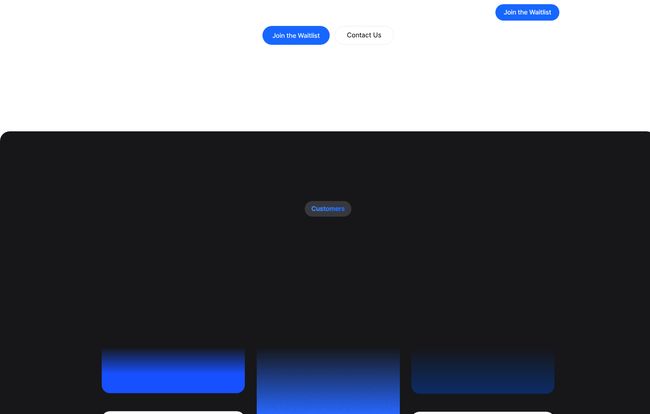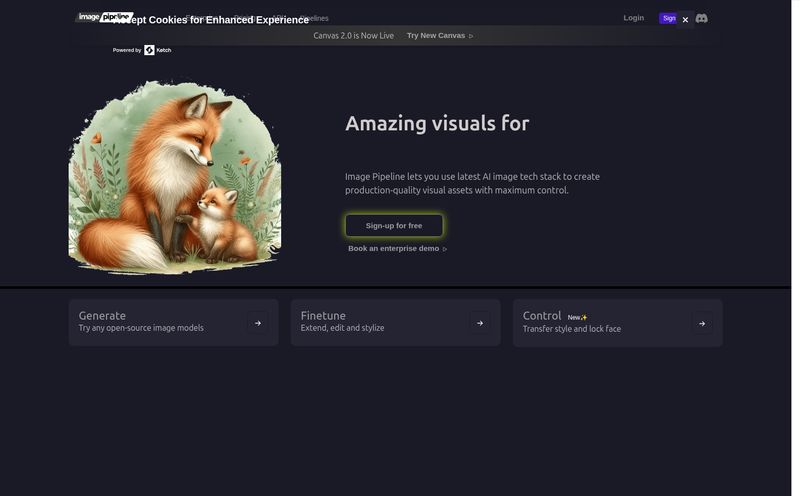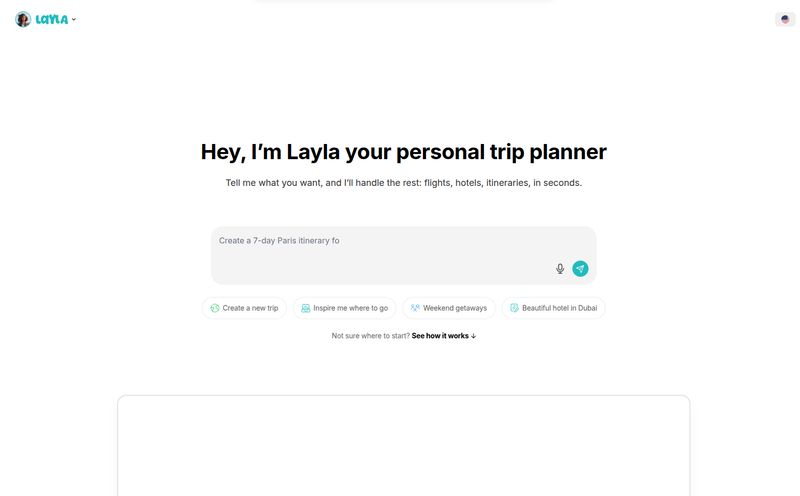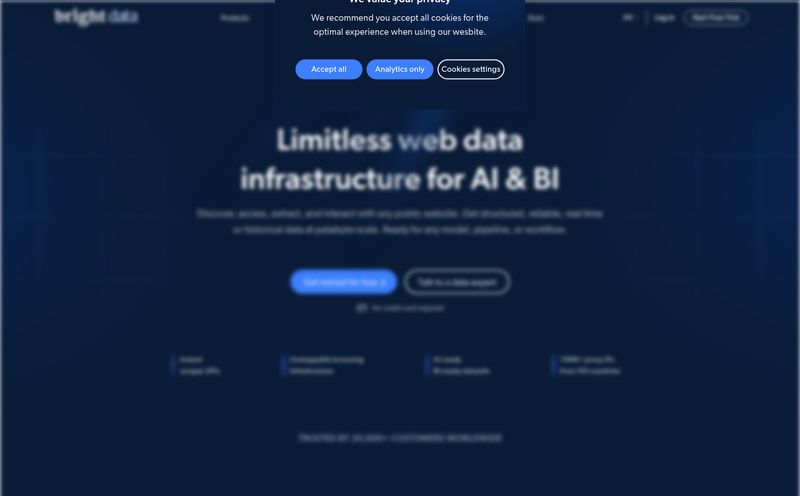Every company I've ever worked with, from tiny startups to giant corporations, has the same dirty little secret. It's not the questionable coffee in the breakroom; it's the internal search function. You know the one. It’s that dusty search bar on the intranet or shared drive that you type a query into, hold your breath, and pray. More often than not, you get a bunch of irrelevant 2015-era PDFs or nothing at all. It’s a digital graveyard where important documents go to be forgotten.
For years, we've just... accepted this. But with the recent explosion in AI and LLMs, the bar has been raised. We can now ask a machine complex questions about the entire internet, so why can't we ask it where to find last quarter's performance report? It’s a paradox that has frustrated me to no end.
Recently, a platform called Linq popped up on my radar. And I have to say, it looks like it might just be the answer to those prayers. It’s not just another search tool; it feels like something fundamentally different.
So, What Exactly is Linq?
On the surface, Linq is an enterprise search engine. But that’s like calling a Formula 1 car just “a vehicle.” It's a platform designed to let businesses build their own powerful LLM-driven applications using their own internal data. Think of it less as a search bar and more as a custom-built brain for your entire organization's knowledge base.
The core of its power comes from what they call hyper-accurate vector search. If you're not a data scientist, don't sweat it. Here's the simple analogy: your old keyword search is like a librarian who can only look at the titles of books. If you don't know the exact title, you're out of luck. Vector search is like a librarian who has read every single book, understands the concepts inside, and can find the exact paragraph you need even if you just describe the idea you're looking for. It's about context, not just keywords.

Visit Linq
Beyond the Buzzwords: The Core Features That Matter
I've seen a lot of AI tools that are all sizzle and no steak. They throw around terms like 'synergy' and 'paradigm shift' but can't deliver. Linq seems to be built on a foundation of solving real, tangible problems. Here's what stood out to me.
The Magic is in the RAG API
This is the big one. Linq is built around a RAG API. RAG stands for Retrieval-Augmented Generation, and it’s the secret sauce behind most of the useful AI tools you see today. Instead of just asking an LLM a question from its general knowledge, RAG first retrieves relevant information from a specific source—in this case, your company's data—and then uses that information to generate a precise, contextual answer.
What’s brilliant about Linq is that its RAG API handles the entire messy pipeline. Any developer who has tried to build a RAG system from scratch knows the pain. You have to handle data extraction, chunking, embedding, indexing, retrieval, and then reranking to get the best results. It's a ton of work. Linq’s proposition is that they handle all that complexity behind a single, clean API. That’s a massive win.
Hybrid Search is Smarter Search
I was also happy to see they use Hybrid Search. While vector search is fantastic for understanding concepts, it can sometimes struggle with very specific terms, like product SKUs, acronyms, or unique names. Hybrid search combines the contextual power of vector search with the precision of old-school keyword search. It gives you the best of both worlds, ensuring you can find both the conceptual idea and the specific document named "Project_Phoenix_Q3_Final_v2_Approved.docx".
One API to Rule Them All?
Linq makes a bold claim: you can finish an integration in a day. That's... ambitious. They talk about condensing months of development work into days. For any CTO or dev team lead, that’s a statement that makes you sit up and take notice. If true, it dramatically lowers the barrier to entry for creating genuinely useful internal AI tools.
Who is This Really For? The Hedge Fund Clue
In one of their visuals, I noticed the phrase "Tailored for hedge funds." That's a very specific niche. It was backed up by a testimonial from a partner at a firm called Stratatech Partners, who mentioned using it during earnings season to cross-reference documents and find insights on adjacent companies. And it hit me. Of course. Finance is the ultimate proving ground for a tool like this.
Hedge funds and investment firms are drowning in data: earnings transcripts, SEC filings, market reports, news articles. The ability to instantly search, synthesize, and cross-reference this mountain of text to find an edge is invaluable. Speed and accuracy aren't just nice-to-haves; they can be the difference between profit and loss.
But it's obviously not just for finance. Any knowledge-heavy industry—legal, biotech, engineering, consulting—faces the same challenge. This is for any organization that realizes its most valuable asset is the collective knowledge sitting on its servers, and wants to finally put it to good use.
Ticking the Boxes that CIOs Care About
A cool API is one thing, but getting it approved in a large organization is another. This is where Linq appears to be very smart. I saw badges for ISO 27001 and SOC 2 Type 1 compliance. These aren't just logos; they are rigorous, third-party audited standards for information security management. For any CIO or CISO, seeing these certifications immediately answers a whole category of security questions and builds a massive amount of trust. Your data is your lifeblood, and Linq seems to understand that.
They also mention a user-friendly admin page for knowledge management. This is another subtle but critical feature. It means you don't need a developer every time you want to add a new data source or manage the knowledge base. Empowering non-technical users to manage the system is key to long-term adoption.
The Good, The Bad, and The... Missing Price Tag
No tool is perfect, and from what I can gather, here's the balanced view.
| What I Like | Points to Consider |
|---|---|
| Hyper-Accuracy: The focus on a high-quality RAG pipeline and hybrid search is a recipe for results that are actually useful. Cited Sources: The ability to provide sources for its answers is a huge deal for trust and verification. No more AI hallucinations. Speed of Implementation: The promise of a one-day integration via a single API is a massive selling point. Security First: ISO 27001 and SOC 2 compliance shows they're serious about enterprise needs. | Integrations are a Work in Progress: The con listed is "Seamless integration is coming soon." I read this as their focus has been on perfecting the core API, and pre-built connectors for platforms like Salesforce or SharePoint are on the roadmap. A common, and often smart, approach. The Missing Price Tag: There's no pricing page. This screams "enterprise sales model." You'll have to contact them for a quote. This isn't a $20/month self-serve tool, and that's probably for teh best. |
The lack of public pricing is expected for a B2B tool of this caliber. It means the cost will depend on the scale of your data, usage, and support needs. It's for serious players.
My Honest Take as an SEO Guy
Looking at Linq, I can't help but think about my own workflows. I have folders full of keyword research, competitor analyses, client briefs, and analytics exports. The idea of being able to ask a single interface, "What was the organic traffic trend for Client X in Q2 last year, and what were the key content pieces we launched?" and get a direct answer with sources... that's the dream. It’s what we all thought we were getting with the promise of the “paperless office” 20 years ago.
Linq feels like a major step toward a true "Google for your company." The inclusion of Multimodal AI as a feature also suggests they are thinking ahead—to a future where you can search not just your documents, but your video meetings, audio calls, and design files too. It's ambitious, but it's where everything is heading.
Frequently Asked Questions about Linq
- Is Linq just another vector database like Pinecone or Weaviate?
- No. It seems to be a complete vector search solution. A vector database is just one component. Linq provides the whole RAG pipeline—data extraction, embedding, the database itself, and the retrieval logic—all in one API.
- What kind of data can I use with Linq?
- The materials state it supports diverse data formats. This typically includes PDFs, DOCX, TXT, PPTs, and more. Given the Multimodal feature, it likely has capabilities for audio and video formats as well.
- How long does it really take to set up Linq?
- Their marketing claim is that integration can be done in a day, which is exceptionally fast. This is thanks to their single API approach, which abstracts away most of the backend complexity.
- Is Linq secure enough for our sensitive company data?
- Yes. Its compliance with ISO 27001 and SOC 2 Type 1 standards indicates it meets stringent international security requirements, making it suitable for enterprise use.
- So, how much does Linq cost?
- There is no public pricing. This means it operates on a custom, enterprise pricing model. You will need to contact their sales team for a quote based on your specific needs.
- What is RAG and why does it matter so much?
- RAG (Retrieval-Augmented Generation) is a technique that makes LLMs much more accurate and trustworthy. It finds factual information from your own data first, and then uses that data to answer a question. This prevents the AI from making things up and ensures the answers are relevant to your business.
The Search for a Better Search Might Be Over
For decades, enterprise search has been a punchline. It’s been clunky, ineffective, and a source of constant low-grade frustration for employees everywhere. We've organized our digital lives into a beautiful, complex library but given ourselves a catalog that barely works.
Linq appears to be one of the new breed of tools that's actually fixing the problem from the ground up. By combining a sophisticated, developer-friendly RAG API with the security and usability that businesses demand, they've built something that looks genuinely powerful. It’s a tool for organizations that are ready to stop just storing data and start actually using it.
Reference and Sources
- ISO/IEC 27001 - Information security management
- AICPA - SOC 2
- Facebook AI Research on Retrieval-Augmented Generation (Original Paper)



